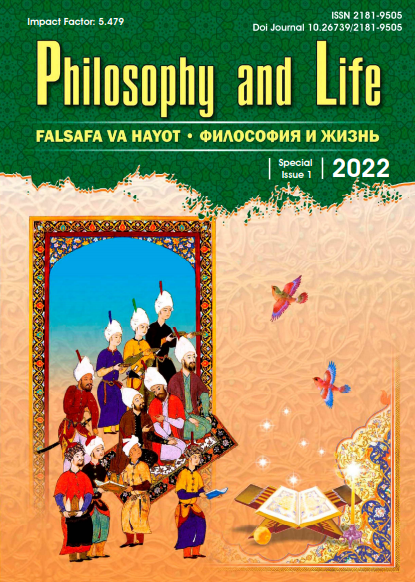INTERNATIONAL TOLERANCE IN UZBEKISTAN AS A MAIN PRINCIPLE OF HUMANITY
Keywords:
humanity, development, science, enlightenment, self-awareness, kindness, honor, andisha, healthy social environment, behavior, mood, spirituality, ideology, morality, aesthetics, religion, gratitude, courage, mapness, sabp satisfaction, forgiveness, attitude, humaneness, mehp love, friendship, bipdam, harmony.Abstract
The most difficult principle of interethnic tolerance is implemented in the field of ethnic relations. The difficulty in implementing this principle is related to the different understanding of tolerance, which is explained by the peculiarities of cultural traditions and the peculiarities of historically formed consciousness and human behavior. However, in the modern world, in order to implement the principle of interethnic tolerance in relations between ethnic groups and nations, there are necessary conditions for the recognition of the community of human origin and the formation of humanity as a whole with developed multinational ties. Adherence to the principle of interethnic tolerance will inevitably lead to a consistent combination of international processes with national stratification processes. Tolerance in national-ethnic relations implies the need to recognize the dual ethnic identity inherent in the identity of a multi-ethnic society. This must be recognized as a legal condition of the person. In this case, the existing national-cultural differences will not be spontaneous and institutionalized, and people will stop hindering each other. Tolerance of another person, nation or culture that differs in its values and way of life is one of the conditions of peace and harmony in the modern world. The article discusses the culture of tolerance as a culture of ethnic (interethnic) tolerance; a culture of racial tolerance; a culture of political tolerance; a culture of religious tolerance; culture of gender tolerance; youth tolerance culture; a culture of organizational or physiological tolerance; a culture of geographical tolerance; culture of social (inter-class) tolerance; a culture of tolerance for education; the division into marginal tolerance culture groups has been philosophically interpreted.
References
М.Вебер Протестантская этика и дух капитализма. https://www.livelib.ru/22495/top-max-weber.
Каримов И.А. Родина священна как святыня. Том 3 — Т.: «Узбекистон», 1996. — Б. 8-9.
Мирзиёев Ш.М. Великим будет и труд народа с великим намерением, жизнь его будет яркой, а будущее благополучным. Том 3 – Т.: 2019. Узбекистан, –Б. 387.
Безюлева Г.В., Шеламова Г.М. Толерантность. Взгляд. Поиск. Решения. - М.: 2013. - С. 9.
Поппер К. Открытое общество и его враги. -М.: 1991. - Т 1. - С. 234.
Безюлева Г.В., Шеламова Г.М. Толерантность. Взгляд. Поиск. Решения. - М.: 2013. - С. 9.
Ш.Мирзиёев Вместе мы построим свободное и процветающее, демократическое государство Узбекистан. –Ташкент: Узбекистан, 2016. – Б. 13-14.
Зийодов Ш. Просветление из глубины веков // Журнал Уроки Имама Бухари, Выпуск 3, 2019, - Б. 3.
Постановление Кабинета Министров Республики Узбекистан от 31 декабря 2019 года № 1059 «Об утверждении концепции непрерывного духовного образования и мер по ее реализации».
Эрназаров Д. (2020). Особенности государственной политики в формировании мировоззрения толерантности у молодежи. Архив научных исследований, 1 (3). извлечено от https://journal.tsue.uz/index. php/архив/статья/просмотр/866.
Каримова В.М. Психология семейной жизни. Методическое пособие. –Т.: ТТМ. 2006. - Б. 30.

